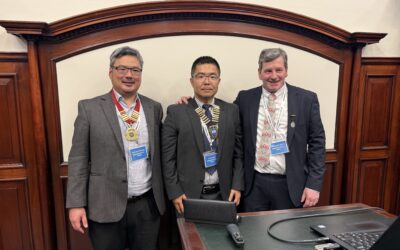The branch was very pleased to welcome retiring ICorr President Sarah Vasey on her farewell tour, to the committee Christmas dinner, which was held at the beginning of December. Sarah has taken a great interest in the work of the branch, as with other UK Branches that she has helped to develop during her Presidency.
L to R: Dr. Muhammad Ejaz, Amir Attarchi, Hooman Takhtechian, Dr. Nigel Owen, Sarah Vasey, Dr. Yunnan Gao, Zahra Lotfi, Bryn Roberts and Stephen Tate of the Aberdeen Branch Committee.
At the November joint meeting with IOM3, Dr Ed Wade gave a presentation to an audience of over 50, on the subject of “Downhole Metallurgy and Corrosion – from the first pipe, to current challenges”, which proved a fascinating insight into the topic that had everyone glued to their seats.
Dr Wade originally trained as a metallurgist and his interest in downhole metallurgy developed during 13 years spent with Marathon Oil in Aberdeen and subsequently as an independent consultant. Since 2004, he has delivered more than 40 training courses focussed on the selection of corrosion resistant alloys for downhole applications, including ‘open’ courses promoted in Aberdeen by the Mining Institute of Scotland (a local affiliate society of IOM3).
Starting with the first use of downhole pipe, the talk progressed through subsequent developments that have remained central to current practice; recent novel HP/HT challenges were also outlined, before closing with an overview of future very challenging downhole requirements for Geothermal Energy and Carbon Storage, such as United Downs Deep Power Project in Cornwall, that will require many thousands of new deep / high performance wells to be drilled and operated under highly corrosive conditions.
It was a fascinating tour through 159 years of metallurgical advancement of tubular goods, commencing with the Drake Well in 1859, (that went on to operate for another 40 years), through to the development of modern API Specs and Coding Systems, trends and advances in North Sea CRA use for tubulars, together with an explanation of how corrosion mechanisms such as Ringworm have been eliminated through improved heat treatments.
The difficulties in adequately simulating and testing for all downhole situations was highlighted along with the sometimes intermittent, and sometimes unplanned operational practices of the Oil and Gas and other Industries, which place huge demands/expectations on material performance in sometimes rapidly changing conditions.
The need for materials to withstand highly corrosive sub-surface gases at very high partial pressures for extended periods, and the difficulties of successfully implementing preventative chemical treatments at immense depth were clearly explained.
It was also evident that composites have still yet to make huge in-roads into the market place f0r downhole use and to successfully compete with the available wide range of corrosion resistant metallics. The main problem here seems to be industry confidence in non-metallics, as being relatively new, difficult to manufacture, and not having well established test protocols for downhole scenarios.
The event generated many questions from the audience that were very well responded to by this distinguished speaker.
The branch 2018/19 session continues on 26 February, with a special coatings technical event. Ajith Varghese of International Paint will talk on ‘A Novel Approach to Combatting CUI’ and Michael Baraky (RMB Products) and Rob Mackie (United Pipeline Systems), will discuss ‘MIC-Resistant HDPE Linings for Seawater Applications’.
Branch Chair Dr. Yunnan Gao presents a Certificate of Appreciation to Presenter Dr Ed Wade of Metal Ecosse after the Event.
Dr Ed Wade’s paper can be found on: https://drive.google.com/file/d/1N2CqylMutsUOjAj5ixPsFeHoRsr1gL1p/view?usp=drive_web and all past Aberdeen ICorr Presentations can be found on: https://sites.google.com/site/icorrabz/resource-center
Full details of future events can be found on the diary page of the magazine and on the website, or contact: ICorrABZ@gmail.com


